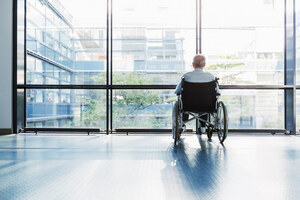
Prosecutors and the families who lost loved ones were left disappointed and disheartened. "Today the justice system failed the families who lost their loved ones at the Holyoke Soldiers' Home,” said Massachusetts Attorney General Andrea Campbell.
But the tragedy at the Holyoke Soldiers Home was not an isolated event, nor is neglect and medical malpractice at veterans nursing homes a thing of the past. And the same causes are cited over and over again – among them short staffing, inadequate training, and the burnout, fatigue, turnover, and neglect that inevitably follow.
Why do these problems persist, and why do they seem insoluble?
Not an isolated problem
Carl Neiper Sr., a proud Air Force veteran, moved to the New Jersey Veterans Memorial Home in Menlo Park in the summer of 2021. His children knew about the pandemic’s deadly toll at New Jersey’s state-run nursing homes in 2020, the management shakeup and the federal investigation that followed. But they believed that the problem was in the past. Six months later Carl Neiper was dead. He spent his last days alone in a windowless basement room.
An issue that has been studied – and then studied again
Short staffing has been credibly linked to a host of patient care problems, including:
- medication errors;
- failure to exercise appropriate infection controls;
- bedsores;
- increases in falls;
- residents going entire shifts without toileting assistance or days without help in bathing;
- absence of basic feeding or changing services; and even
- abuse, when no one was watching.
A new remedy
In September 2023, the federal Center for Medicare and Medicaid Services (CMS) announced that the agency would invest over $75 million to launch a national nursing home staffing campaign to increase the number of nurses in nursing homes. The campaign will include financial incentives for nurses to work in nursing homes.
On May 10, 2024, CMS issued a new rule designed to improve patient care in nursing homes that receive federal Medicare and Medicaid funds. The new rule requires that:
- residents receive at least 3.48 hours per day (hours per resident day or “HPRD”) of nursing care. This must include at least 0.55 HPRD of direct registered nurse care and 2.45 HPRD of direct nurse aide care.
- facilities may use any combination of nurse staff (RN, licensed practical nurse, licensed vocational nurse, or nurse’s aide) to account for the additional 0.48 HPRD needed to comply with the total nurse staffing standard.
- an RN will be required to be on-site at all times.
Rural facilities may be exempt, but for all others, the new standard is to be phased in over three years. Phase one, which was to have been completed early in August, requires that facilities assess their institutional needs. Phase two, which must be completed in 2026, requires facilities to meet the overall 3.48 hours of nursing care standard and to have an RN on-site at all times. Phase three, to be completed in 2027, requires that nursing homes meet the remaining allocation of time requirements.
Instant outcry
On May 23, the American Healthcare Association, together with the Texas Healthcare Association and several Texas nursing homes filed a lawsuit in the Northern District of Texas, Amarillo District, challenging the new CMS standard. On August 14, the State of Texas filed a similar lawsuit in the same court. Both lawsuits argue that the standards are unworkable, will put smaller and more rural care facilities out of business and deprive patients of needed care.
READ MORE VETERANS MALPRACTICE LEGAL NEWS
Losing sight of the question
But would any of this have made a difference for the 76 veterans at the Holyoke Soldiers’ Home or Carl Neiper? That is the question that seems to get lost as well-organized and deep-pocketed interest groups fight it out.
